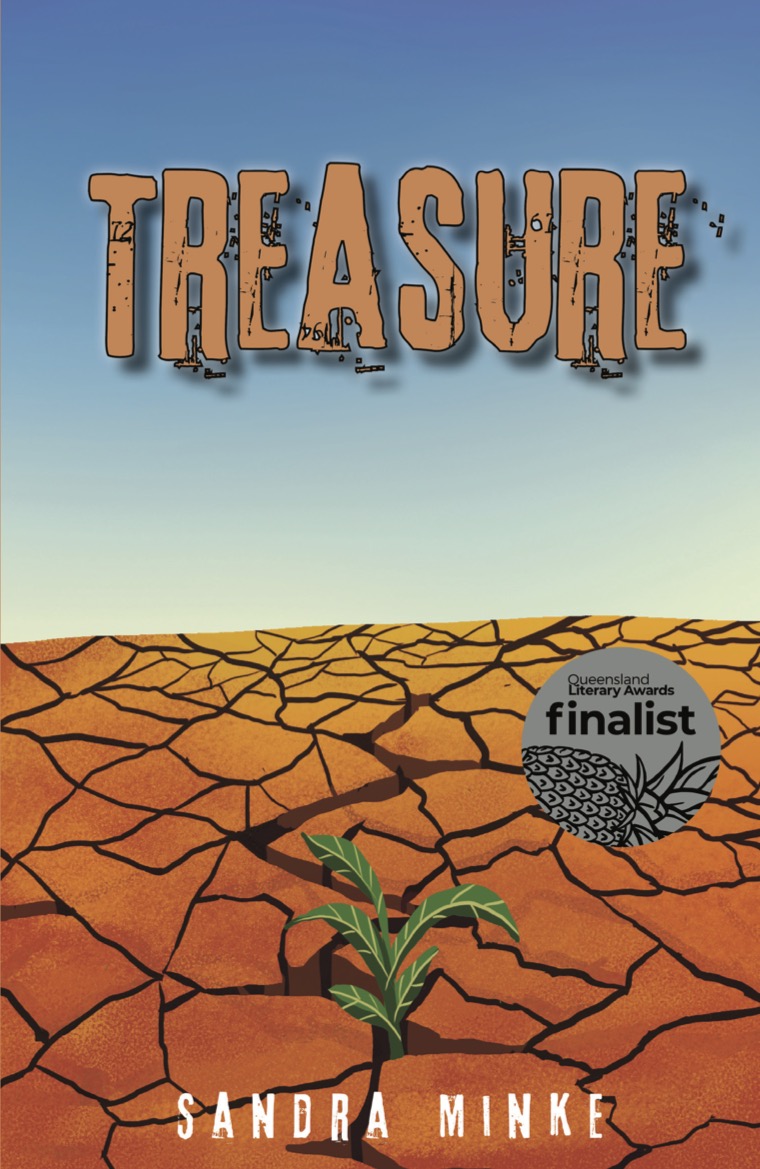Treasure by Sandra Minke

What a strange and unusual book Treasure by Sandra Minke is! One expects Treasure at first glance to be a family saga-perhaps about a fictional family (based on historical fact) caught up in the South Australian colonial dream and (subsequent heart-breaking failure) of pushing agriculture beyond the line delineating arable from drought afflicted land which was drawn by Surveyor-General George Goyder in 1865. One expects a straightforward family narrative, perhaps spanning generations, about a struggling family and community. Sandra Minke does this but strangely and quite unexpectedly the book transforms/merges/ into a type of magical realism. A hazy dream-like quality emerges around the time of the disappearance of the mother and shimmers throughout the rest of the story around the struggles of the family as they try to wrest a living from the land north of Goyder's line. Treasure continues with one foot in the miserable homestead in the bush and the local dying town and the other in a strange atmospheric dream-like state. The dream-like state creates apprehension, fear and desolation.
This haze is so appropriate. The days are harsh. Bitter winds blow away the top soil and the seed. The heat is oppressive. There is no water.
Attitudes to the land and what constitutes good management re the natural environment have shifted considerably. The revered forefather, Cyril Treasure, who broke the land, cleared it and got a few good years off it, broke the land literally- took all it had to give. Future generations could not continue with the same model of farming. However they didn't understand and so blamed themselves for not having the magic touch of their forefather. Rural suicide, the impact of the war on family, rural hardship and isolation and small town politics are all depicted so well in Treasure. What makes a man a big man in one generation may not be viewed the same way generations down the track. Treasure is really an exploration of Australian identity moving away from the Australian pioneer farmer and bushman, (the masculine (hyper) character) towards a realisation that the ignorance of our forebears ruined the fragile land particularly the soil.
The women in Treasure represent strength, solidity and a deeper connection to the environment and fertility through their own stoic resilience and through the collection of seed and the establishment of gardens. It's a harsh story of loss and grief. Sons go missing in the war and die as a result of farm accidents. The mother (whose character is never fully developed) disappears into the haze- never to be seen again. She comes to the farm as a young wife for Barnaby and she brings music and creativity. She takes to walking and squatting...."down low to the ancient dirt and letting " handfuls of it run like ash through her fingers" and standing amongst the "murdered trees" and opening her chest "to draw the place into it". It becomes apparent that she is untethering from the world of humans into the environment. The old ladies and Barnaby are referred to by name but she is always the younger woman, Barnaby's wife...she never seems to form a solid identity. She has an affinity with the soil, seeds and plants but she is shadowy and insubstantial herself- like the fragile land from which the men are trying to force a living. There's much grief in this book and a sense of creeping doom.
Treasure ensued that Minke was a finalist in the Glendower Award for Emerging Queensland Writers(2023). In the Author's notes and Acknowledgements Minke claims a visceral connection to the land. She grew up in rural Victoria and saw the great clouds of topsoil drifting in from the drought ravaged Mallee area. Her husband grew up on the Eyre Peninsula, South Australia very close to Goyder's Line. Treasure is a very interesting and very Australian read.
Themes: Goyder's Line, cropping/farming in South Australia, family, inheritance, the environment, ANZAC, soil management.
Wendy Jeffrey